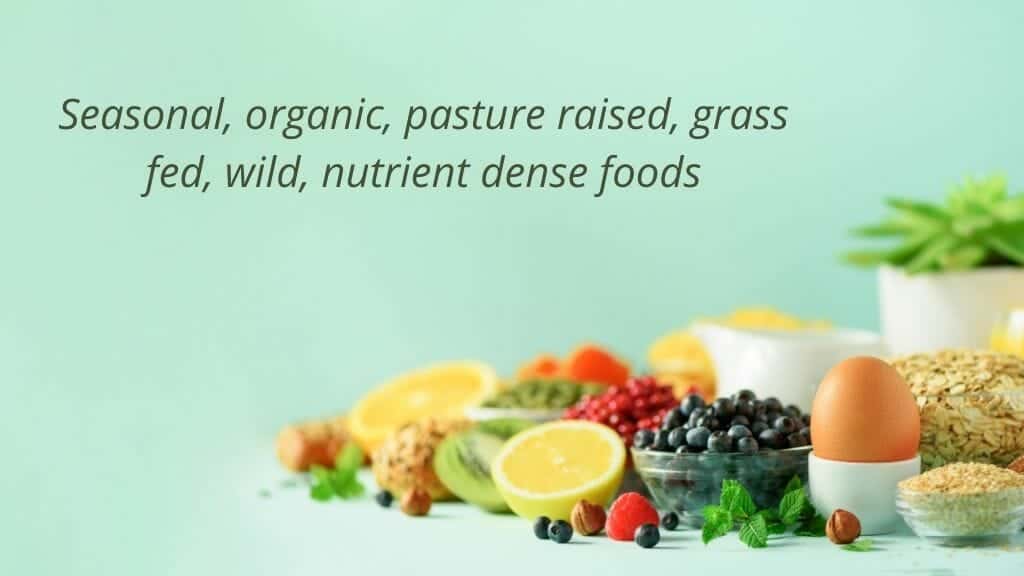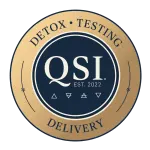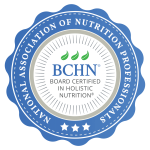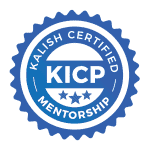Your goal: learning how to feed your family a nutrient-dense diet. Packing your meals full of nutrients means giving your body what it needs to feel great. It also means taking a step back to look at what you’re eating now and how you can be more thoughtful in your food selection and preparation.
Why is a nutrient-dense diet for your family so important?
Where your food comes from is key to quality – we are what we eat! Eating take-out fast foods can be really expensive. Let me show you how to swap take-out for whole nutrient-dense foods. They can be simply prepared in little time, Are you ready?
Small changes, little by little, over time will make a big impact. And remember that you may literally pay a high-price with your health tomorrow by eating low-quality foods today.
So you have decided to switch up your foods but where to start when you are on a tight family budget? Start with organic food.

What is organic produce?
Organic produce is non-GMO, free from chemical pesticides and fertilizers. It grows in an environment using crop rotation to create healthy soil. Healthy soil is alive with a diverse ecosystem full of organic matter. Livestock roams pastures, grazing and rooting around for bugs, from birth till death. Fish living wild in the ocean is sustainable and healthy.
Conventionally raised animals live in very poor conditions. You may have seen the photos. They eat GMO-corn and soy. And they are fed a cocktail of unpleasant antibiotics. We live in a delicate interdependent ecosystem.
Look for pasture-raised pork, chicken and eggs; grass-fed beef and dairy; and wild-caught fish. Healthy, happy animals equals meat with higher levels of omega 3s, lower saturated fat and higher vitamin and mineral count!
Budget nutrient dense diet strategies for your family
My strategy for your nutrient-dense diet focuses on buying bulk meats/fish/frozen fruit and vegetables, knowing what to buy where and planning weekly meals based on sales – think seasonally!
- Start paying attention to what each grocery store charges for the same food and buy accordingly. It’s worth it to go to multiple stores because 50 cents here and $2 there will add up. For example – avoid buying chicken parts, especially organic white meat, which can run $9/lb!
- Make your weekly menu based off of what is on sale at the grocery store. Buy seasonal. We’ve all had strawberries that taste like cardboard in November… food will taste better, have higher nutrient density and cost less. Many grocery stores sell local, organic produce – just look for the labels.
- If you can’t buy 100% organic, use the EWG’s Dirty Dozen and Clean Fifteen (Environmental Working Group EWG’s 2021 Shopper’s Guide to Pesticides in Produce retrieved from https://www.ewg.org/foodnews/dirty-dozen.php) as your guide to know which produce has the highest and lowest chemical load.
- Organically grown and properly processed grains – brown rice, quinoa, beans and lentils are a great way to cost-effectively incorporate nutrients into your diet. Buying these in bulk will be cheaper. Give meatless Monday a try!
Grow your own vegetables even if you live in a tiny condo
- Make use of onions, garlic, herbs and spices to add flavor with little cost. You can even create a small herb garden in a pot during the warmer months or keep the roots from your green onions and set them in water on your windowsill.
- Consider rebate programs like ibotta that tend to feature organic products like condiments, nut butters, yogurt, eggs, milk. Keep packaged goods to a minimum! Shop the perimeter of your grocery store.
- Quality fish can be expensive. Canned sardines and anchovies are a budget friendly option. They are packed with nutrients. Frozen wild-caught fish like salmon is a more expensive option. Buying frozen in bulk is cheaper and better quality.
Don’t forget your freezer for your nutrient-dense diet
- Your freezer is your friend. You can freeze almost all foods. Consider investing in a chest freezer – you’ll recoup the savings quickly when buying bulk meat. It allows you to stock up on sales of frozen fruit and veg. I’m a fan of Wyman’s wild blueberries which I buy in bulk. You can vacuum seal some fruits and vegetables and enjoy fresh in January! This can become a favorite family activity – seasonal canning.
Nutrient dense diet strategies for shopping at farmers’ markets

A special note about farmers’ markets. They are such a gift to our communities. You can build relationships with local farmers and support their hard work of raising our food in a sustainable way. I know they can have a reputation as being unaffordable, but check out these tips and give your market a try this spring.
- Go to the farmer’s market just before closing to buy the discounted produce.
- Consider buying 2nds, especially of apples and stone fruits. I always go to the $2/lb tomato basket and make gazpacho or sauce with the overripe tomatoes. Remember, it doesn’t have to be pretty to be good for you!
- If you qualify for food assistance, see if you can receive it as “money” that can be used at the market. Many states allow this. Another example might be to find out if volunteering with the market gives you a buying discount.
- Subscribe to your farmer’s market newsletter. You’ll get a weekly update on what farmers will be selling – and even recipes to utilize the produce.
- If you’re adventurous, give a CSA (community-supported agriculture) box a try this season. Each week, you’ll pick up your box of produce from your selected farm, which is full of that week’s harvest. Most CSAs allow you to choose how much produce you want – family of 2, 4 or 6. Therefore, it will likely include veg you haven’t tried before, so it “forces” you into experimenting with new flavors and recipes!
Live Life Well!
Join our email list for exclusive offers and the latest news
We agree to never spam you, by submitting you agree to our Terms of Services
Local suppliers
Locally in Boulder County: Ollin Farms and Aspen Moon Farm both offer CSAs. Many ranchers sell at the market bringing their beef, lamb, goat and pork. Buckner Family Ranch specializes in 100% pasture raised pork and 100% grass fed beef and lamb.
Ok, you’ve bought your whole food – high five! Now how to prepare your nutrient dense diet?
Food preparation tips for your nutrient-dense diet
Our goal is to maximize nutrient intake and digestibility of our food. Learning which foods to pair together can increase their impact even more! Don’t be overwhelmed.
Start small and you will soon be adding new recipes and loving the tastes of your whole-foods nutrient dense diet.
You will discover that whole foods often require very little preparation. What you invest in your hard-earned money, you will make up for with time to spend with your family.
Get your family involved in your mission to convert them to a nutrient dense diet. You will be teaching them to take care of themselves and their future families. This will impact generations to come.

Here are some of my food preparation tips for a nutrient-dense diet:
- Choose cultured dairy like sour cream, yogurt and cheese instead of milk and cream because it reduces lactose content. It makes them easier to digest and has a lower glycemic index.
- Fish: light cooking like poaching, baking, steaming and searing is best to preserve the fatty acids.
- Vegetables: some nutrients are destroyed by cooking, while others are enhanced (Nutritional Effects of Food Processing, Fabbri & Crosby, 2015). Let’s look at what various methods of cooking does to vegetables.
- Eating carrots and spinach raw maximizes vitamin C intake. Vitamin C is easily destroyed by excessive heat and water, as well as exposure to air.
- Some vegetables can be hard to digest raw like broccoli, so be aware of this if you have digestive issues.
- Steaming is a great way to go because it helps retain nutrients that would end up in boiling water.
- Cutting up fruits and vegetables generally frees up the nutrients by breaking down rigid plant cell walls.
- Crushing and chopping onion and garlic releases alliinase, an enzyme in these foods that helps form a nutrient called allicin. Allicin, when eaten, helps form other compounds that are really great for our microbiome.
- Soaking grains and beans reduces phytic acid, which can block your absorption of iron, zinc, calcium, and magnesium therefore best to soak.
- Learning how best to store your fruits and vegetables to retain their nutrient density is important to learn. But I will leave that for another day.
Next steps for getting started with your nutrient-dense diet
Remember that “Rome wasn’t built in a day”. It takes time so start with baby steps and you will soon be a champion of nutrient-dense sourcing and preparation in your kitchen. You will be doing it all while staying true to your family budget. The expensive low nutrient frequent take-out meals will be replaced by family preparation of fun, easy, nutritious eating and enjoying a nutrient-dense diet. And you will be helping your family to prevent chronic illness down the road.
References:
Fabbri, A. and Crosby, G. (2015) A Review of the Impact of Preparation and Cooking on the Nutritional Quality of Vegetables and Legumes. International Journal of Gastronomy and Food Science.
EWG.org Dirty Dozen 2021 retrieved from https://www.ewg.org/foodnews/dirty-dozen.php.



